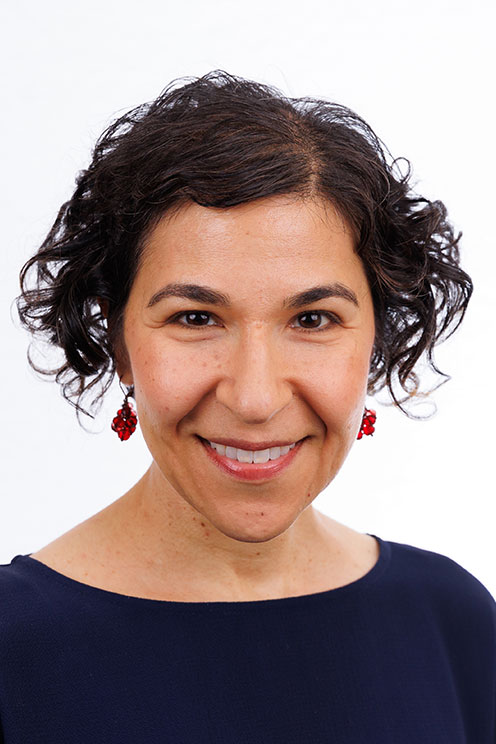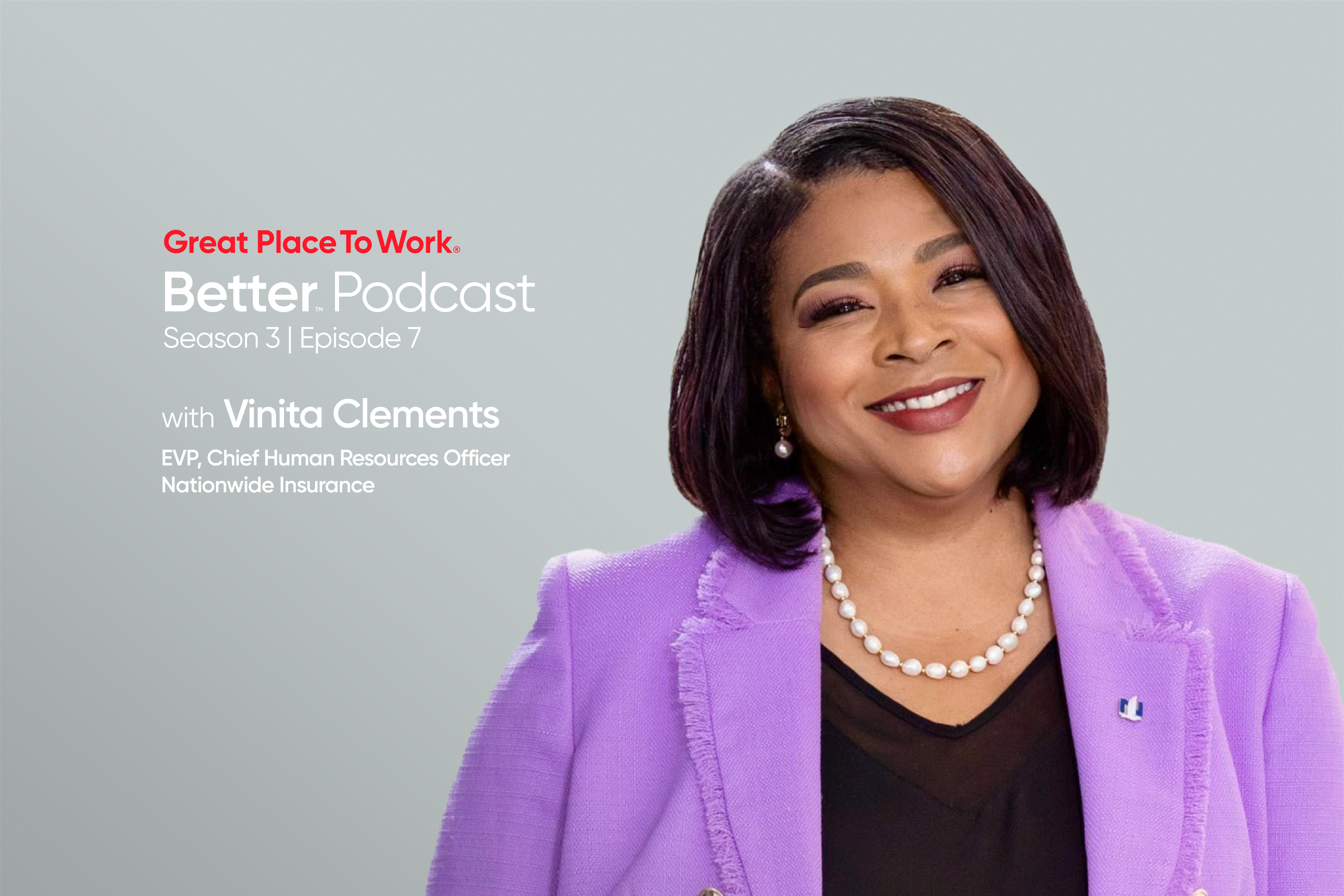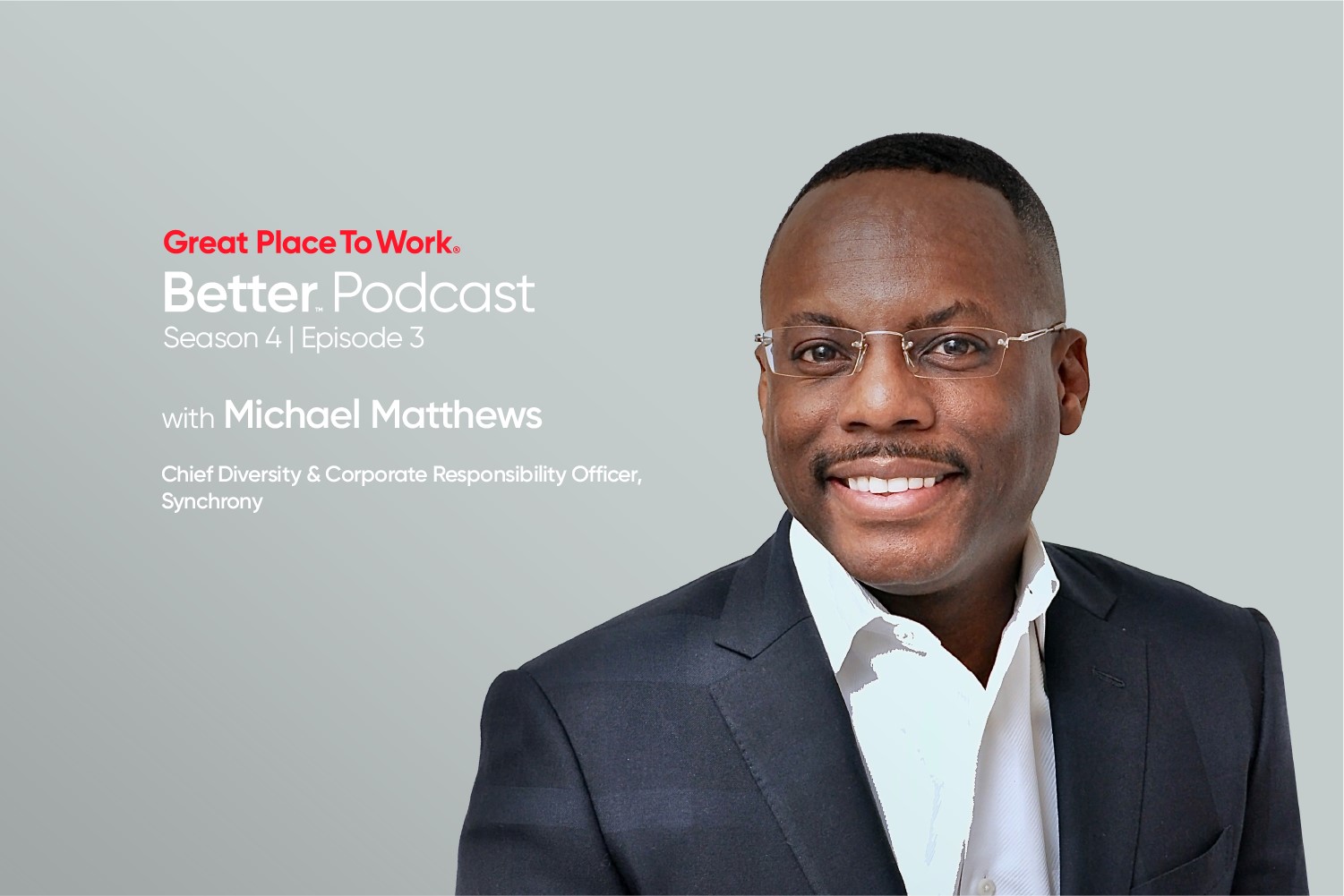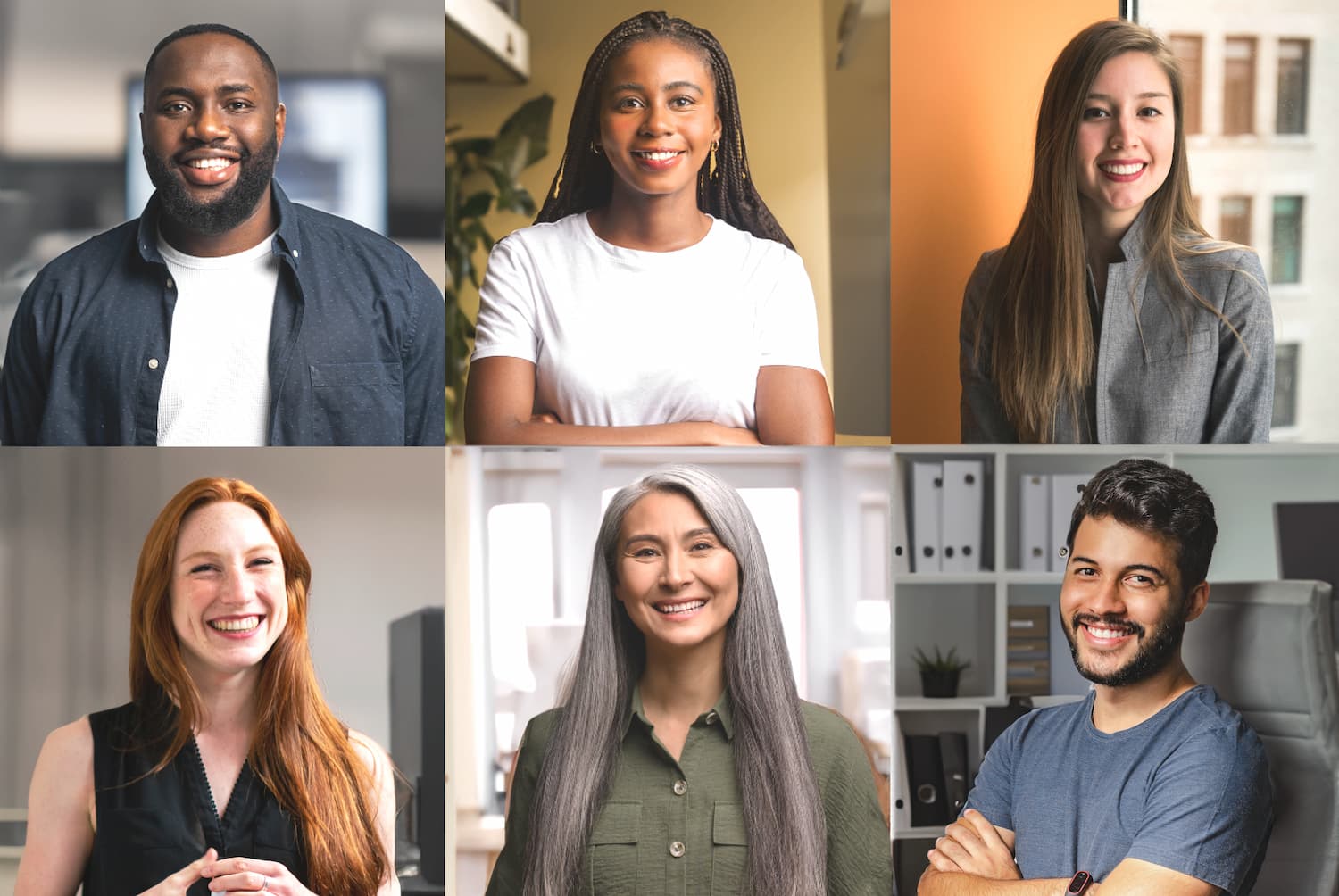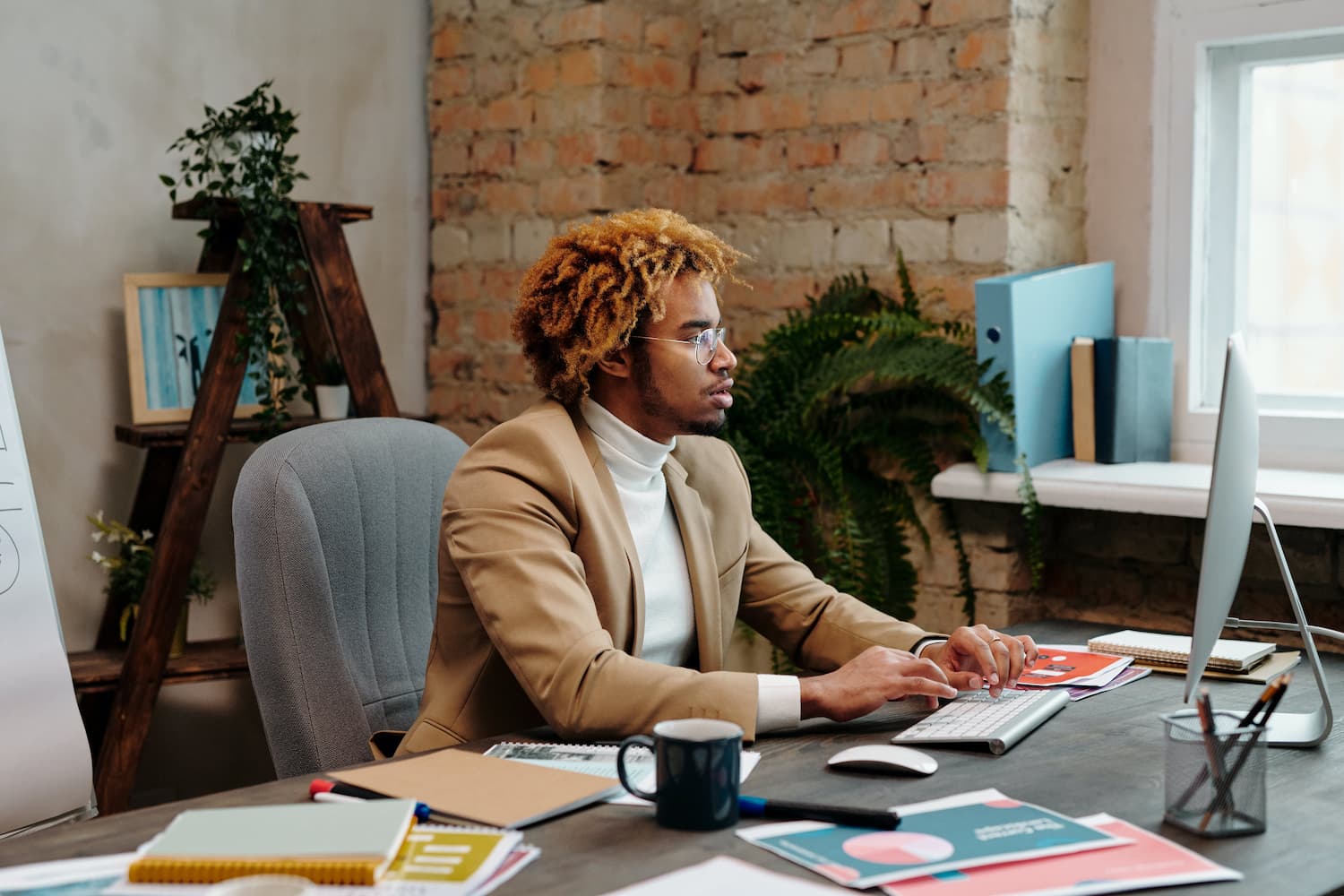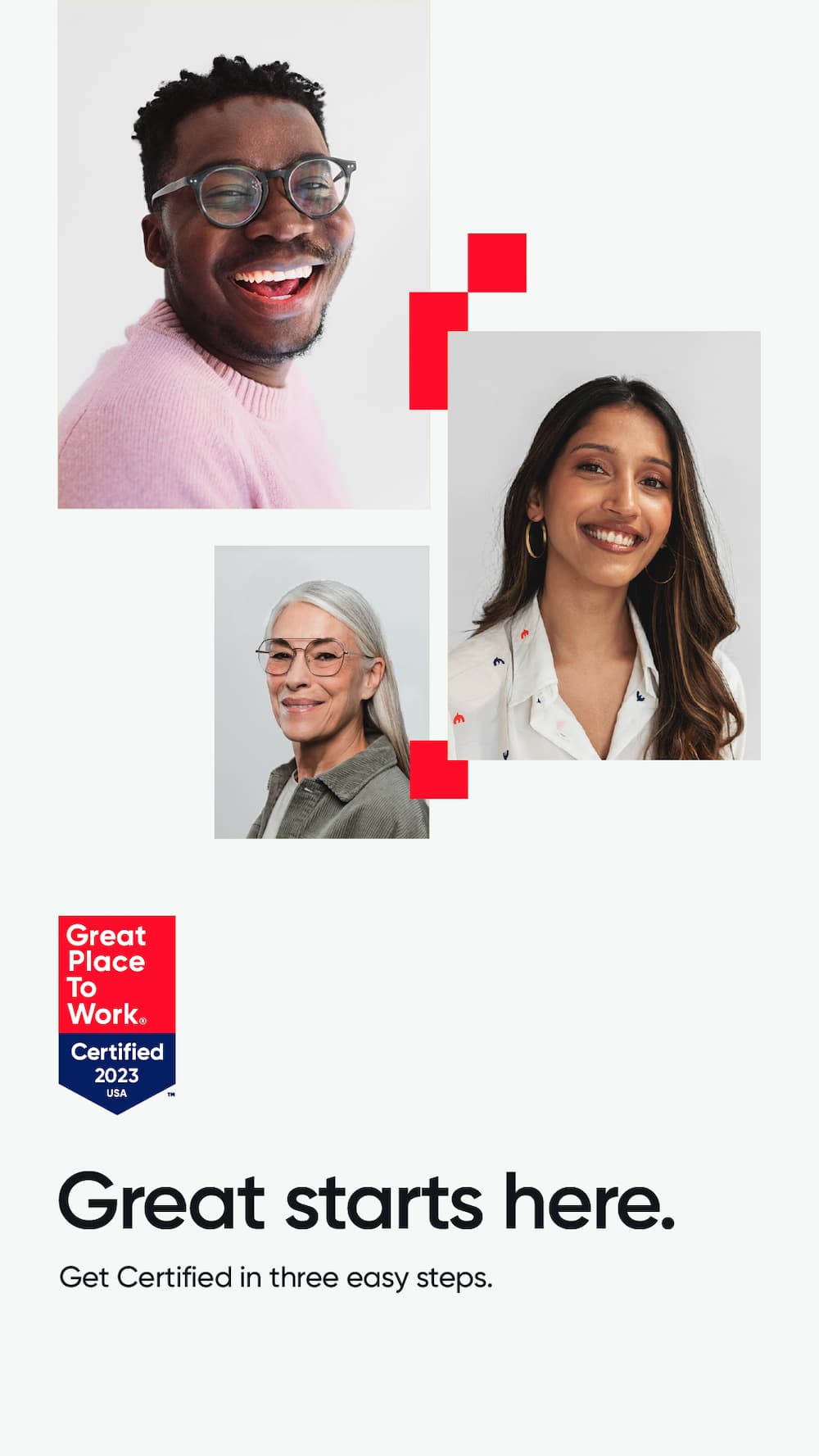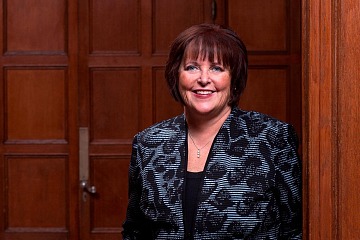Belonging, Employee Experience, Employee Well-being, Leadership & Management
“We no longer can be concerned only with work experience. We have to be concerned with the life experience of our associates.”
On this episode of the Better podcast, Vinita Clements, EVP, CHRO of Nationwide, talks about the importance of belonging at work, and why it’s mistakenly overlooked as a soft skill and not a business imperative.
She shares how active listening from leadership is key to the company’s communication strategy, and why having tough conversations — even without having all the answers — keeps employees connected to the company.
On why belonging gets overlooked — and its impact on the bottom line:
It gets overlooked because it’s a soft skill, and sometimes causes conversations to go in a place where leaders may not know how to navigate.
So, there is a sense of courage in communication — not necessarily having all the answers and not feeling as though you have to. Being heard is key. If you feel like you can be heard, and you have a place where you can talk.
That’s why it sometimes gets overlooked. It's much easier to say, "Here's our results and here's where we're lacking, and let's stay focused on that."
But you have to bring the full associate to work. What I've often said is we no longer can be concerned only with work experience. We have to be concerned with the life experience of our associates. Families are much more important. So how do we assist our associate and their family? How do our benefits show that and demonstrate that?
We use our partnerships as a way to enhance belonging for our entire population. Belonging sometimes means, “I might not feel like I'm doing the work here in this portion of my job, but Nationwide allows me to work with the food bank or Nationwide allows me to work with the Columbus Symphony Orchestra.”
When people feel they're in a position to serve and give back, they feel a stronger sense of belonging. And that's what I mean about leaders having the responsibility to talk to their associates, understanding what's on their hearts and minds.
Stats have shown that when people feel they have trust and open communication, they're 50% more productive. That works for the bottom line.
On the importance of listening:
The first rule of engagement is that people need to feel connected to their teams and to their leader. We have leadership training that help leaders understand how to run team meetings and how to connect with their team – what are some open-ended questions to really start a conversation, and what to listen for. Teaching them how to be active listeners is a pillar in our communication and listening strategies.
Our CEO does coffee chats, and we hold listening sessions where people ask questions in real time. No question is barred.
What we have promoted is conversation. And in those conversations, people will talk about what they want. They'll talk about, "I have a passion here. I don't feel like I'm connected. And here's why."
On the value of employee resource groups:
We have 15 associate resource groups and use them as a voice. Retention strategies became really, really important. And so, this demonstrates how we use this group.
I combined our talent acquisition office, which is the group that hires, and our DE&I office, together under one leader. It's proving to be a best practice now.
Our partners in our DE&I space became even greater partners as we have job openings.
Now we're tied into all of those partners with openings. We make sure that the ARGs understand what jobs we have open. So they have friends and it becomes word of mouth.
And we have had great success on increasing our diversity and equity overall because we use our ARGs in a way that demonstrates that we need you. We can utilize the power that your group has, and it helps Nationwide overall.
On the need to continually evolve company culture:
People ask, "What are the next steps for a culture? You're a Great Place To Work, you’re at your highest engagement."
For me, it is an interactive culture. The culture can't stay stagnant, especially in an environment where people work in different places, in different times. And how do you make sure that your culture is alive?
And so, one of the priorities and strategies is to evolve the inclusive culture that we have. And that means, really, people go, "Oh yeah, but how do you do that? That seems hard."
And I go back to listening. If you ask people what they need and what they want, they will tell you. But you then have to go and figure out how to help implement and how to utilize those groups of people to make a difference.
Subscribe to Better wherever podcasts are available, so you don't miss an episode of season three.
Roula Amire:
Welcome to Better by Great Place to Work, the global authority on workplace culture. I'm your host, Roula Amire, content director at Great Place to Work. On this episode, we speak with Vinita Clements, EVP Chief Human Resources Officer at Nationwide.
Vinita, welcome to the podcast.
Vinita Clements:
Thank you for having me. Happy to be here.
Roula Amire:
You are a fellow Ohioan?
Vinita Clements:
I am.
Roula Amire:
So Nationwide is in Columbus, Ohio, which is my home state. I was an intern when I started my journalism career. I interned at the Columbus dispatch.
Vinita Clements:
Really?
Roula Amire:
Yeah. Yep. Yeah, I covered city news.
Vinita Clements:
Very nice.
Roula Amire:
That's a newspaper many moons ago. I'll begin today by sharing a recent market survey we did at Great Place to Work. So we surveyed in July of 2022, about 4,200 employees at a typical average company. And more than half of them said they're open to leaving their jobs by the end of the year. And that said, we know a key driver of retention of keeping employees is purpose. So when we look a little deeper at the experience of employees in the financial and insurance industries, only half feel their work has special meaning, compared with 86% of employees at companies at great workplaces and the best workplaces like Nationwide.
I'm wondering, what advice would you give to other leaders to help them tie purpose to what employees do day in and day out?
Vinita Clements:
Yeah, that is a great question. And that stat really hits home because what we found is, through the pandemic, people really did have time to reflect. And so, purpose became much more meaningful for people, and they really were trying to understand, what type of work do I really want to do? What brings me joy? What is great for my family? And so, we saw a shift in expectations and what they expected a company to deliver in terms of meeting their passions. What we have done, and the advice I would give is, one, making sure that the mission and vision of your company is very clear. We streamlined our mission. And so, it is-
Roula Amire:
During COVID?
Vinita Clements:
Actually, right before COVID.
Roula Amire:
Okay.
Vinita Clements:
But it really strengthened during COVID because through our Let's Connects, we were constantly emphasizing to protect people, businesses, and futures with extraordinary care. No one knew what the mission was before. You couldn't state it. So it's funny in that our CEO would get in the elevator, this was before COVID, and now even so afterward, and people expect him to ask me what the mission is so they could repeat to protect people, businesses, and futures with extraordinary care. So one is making sure people understand what the mission and purpose of the organization is. And then it is really up to leaders to make the connection for the work that we do every day and how that makes a difference.
Now, for Nationwide as an insurance company, it's very easy when a hurricane hits, we can show videos and see how we're helping our customers. When the claims come in, why it's so important. So it really helps people understand how their role is impacting the lives of people. I think that servitude is really important for people to understand how it connects. And so, the more you understand the work that you do and how it serves others, brings more fulfillment.
And what I would say is that there are jobs that people don't really have to interact directly with a customer. And I always say, we're customers to each other. Companies are really about relationships today. And so, when you think about being there for each other, having a culture that cares, that really helps demonstrate having that connection and bringing passion to work. And so, those are some of the things that we've done. I would also mention our mission moments that matter. We have been very deliberate about showing videos and stories that capture how our work is meaningful in everything that we do and how it impacts the bottom line, how it impacts the customer. And those stories have really made a difference. It helps people see to understand the work that we do.
Roula Amire:
So let's rewind just a bit. You mentioned you revamped your mission and vision statement just prior to the pandemic. Before, it was something that no one knew. It's on a wall somewhere, maybe on a piece of paper and the desk of HR. What was the impetus to take a look at that and revamp it and make it succinct and something everyone can know and tell? What drove that?
Vinita Clements:
We do a survey. And part of the questions in our survey is, the work that I do matters and the work that I do is tied to our mission and vision and I understand my mission and vision. Those were low scores. And so, we realized, through the surveys, through the feedback, that people really don't have that connection. And so, the first impetus was to make sure we made it simple. We had to simplify it so that people could really understand it. And it was a lot of work that went into those nine words. But as they really looked and simplified and had focus groups around it, the leadership team talked about it, we landed on those words and it has been a great impact for our entire population.
Roula Amire:
How big of an undertaking was that in terms of length of time?
Vinita Clements:
It probably was some... We had worked on it. It was a while. I'd say somewhere between six to eight months of just really... It's the work you do behind the scenes when you know from a survey, an annual survey. This is the work we need to do, so it started to roll out for the next year. So it was an undertaking, but well worth it.
Roula Amire:
I think this is great you're sharing this because other companies and leaders will look at these lists and say, "Oh, you're a best workplace." But you're improving. There are always areas that we can all do better. So I think that's great to share. We weren't hitting the mark here, and so, we made a change and you're continually improving. You also talked about it falls onto leaders to help employees find the sense of purpose, you said it's on us to do that. That's hard to do for many companies. Employees are now working in different places, different time zones, all across the world, flexible model. Any lessons learned? Any tips you can share on how a leader can do that? If they say, "It sounds good. Vinita, this sounds great. Sure, I'd love to connect purpose to my employees. I'm busy, they're busy. They know what we do here. They should know." What would you say?
Vinita Clements:
I'd say that's the first fallacy. What I have learned and what I know about people is that there is a need to connect and that we are never too busy to connect. That is what we do. We have a caring culture. And with that, being able to trust, have open communication, is really what brought us through the pandemic. We have just come off of a year where we've had the highest engagement in our history. And who would've thought going through a pandemic with so many different workforce models, because we now are a hybrid workforce model, it was communication. And when I tell you it is embedded at every level, I would also say that we knew leaders were in the seat to connect with their people, unlike anyone else.
The first rule of engagement is that people need to feel connected to the teams and to their leader. So we do have leadership training that help leaders understand how to do your team meetings, your virtual meetings, how to connect with your associates, what are some of the questions that you can ask open-ended to really start a conversation, what to listen for. So there's modules and training for our leaders. It is really, I think, a pillar in our communication strategy and our listening strategies, teaching them how to have active listening.
Our CEO does coffee chats. Let's just chat. Let's get on the line and let's talk. The OCEO has listening sessions. People ask questions real time. No question is bard. So what we have promoted is conversation. And in those conversations, people will talk about what they want. They'll talk about, "I have a passion here. I don't feel like I'm connected. And here's why."
We are a organization that's very charitable. We have a foundation that works with many nonprofits. Belonging sometimes means I might not feel like I'm doing the work here in this portion of my job, but Nationwide allows me to work with the food bank or Nationwide allows me to work with the Columbus Symphony Orchestra. We use our partnerships as a way to enhance belonging for our entire population. We volunteer, the Red Cross. We have associates helping associates.
I have learned that when people feel they're in a position to serve and give back, they feel a stronger sense of belonging. And that's what I mean about leaders having the responsibility to talk to their associates, understanding what's on the hearts and minds. And honestly, stats have shown that when people feel they have trust and open communication, they're 50% more productive. That works for the bottom line.
Roula Amire:
So in that same market research survey, we found that, at a typical workplace, 65% of workers felt like they can be themselves compared with 90% at the best workplaces, like Nationwide. So that speaks to belonging. I mean, that is belonging. I feel like I can be myself at work. Why can belonging get overlooked at companies? You've talked about how it can help the bottom line and what it can do. Why does that get overlooked? I mean, belonging, as an average company, again, I'm making assumptions, likely isn't seen as a business imperative. Why should it be?
Vinita Clements:
Yeah, I think it gets overlooked because it is a soft skill and it sometimes causes conversations to go in a place where leaders may not know, "I don't know how to talk about that." So there is a sense of courage in communication, not necessarily having all the answers and not feeling as though you have to. Being heard is the biggest part, being heard. If you feel like I can be heard, I have a place where I can talk. So I think that's why it's sometimes gets overlooked. It's much easier to say, "Here's our results and here's where we're lacking and let's stay focused on that," but you have to bring the full associate to work.
What I've often said is we no longer can be concerned only with work experience. We have to be concerned with the life experience of our associates. Families are much more important. So how do we assist our associate and their family? How do our benefits show that and demonstrate that? So it is a shift in how companies normally used to look, "Let's look at the business, here's the results." It is taking the time to really impact the full engagement of the life experience of our associate.
We have an associate wellbeing organization that has been instrumental in that space. And so, leaders can say, "We have a group that can help. Help me get to the passion point." So there are all of these variables that work together. So leaders are not alone in it. There are support systems in the organization. And so, we do things like a mindful Monday, wellness Wednesday, and that just brings out a different element of emotional wellness that then an associate can say, "I've reflected on this and I think I want to do this" when they talk to their leader. And then the leader can build a development plan and work with that associate. So it all works together.
Roula Amire:
ERGs, employee resource groups, they help give employee groups a voice and foster a sense of belonging. Many companies have created them or expanded them during the pandemic, which is a great first step. What should they do to go beyond sending up the groups? What other steps are needed for them to be successful?
Vinita Clements:
We have many associate resource groups. There are 16 of them. They've been focused mainly on demographics within the workplace. We also have activities groups. And what I have found and what we know is we use them as a voice. So in our culture, and you alluded to it earlier, there was this people looking for other jobs and there is a war for talent right now. And so, retention strategies became really, really important. And so, this demonstrates how we use this group. We decided, and I combined our talent acquisition office, which is the group that hires, and our DE&I office, all together under one leader. It's proving to be a best practice now.
Roula Amire:
When did you make that change?
Vinita Clements:
When I came into the role about a year ago.
Roula Amire:
Okay.
Vinita Clements:
Awesome move because our partners in our DE&I space became even greater partners as we had job openings. Now we're tied into all of those partners with openings. We took every opening and we make sure that the ARGs understand what jobs we have open. So they have friends, it becomes word of mouth, let's get the word out. And we have had great success on just increasing our diversity and equity overall because we use our ARGs in a way that demonstrates, we need you. We can utilize the power that your group has, and it helps Nationwide overall.
We have started a CEO associate advisory group, where just getting another perspective from associates. We really want to flatten the organization when it comes to conversation. We have direct conversation with our associates that shouldn't have to funnel through seven, eight layers. And so, the more that you can find a way to talk to associates for them to be heard actually does help. And the ARGs have been instrumental in that way.
Roula Amire:
It's not just having the groups, but they're actionable. They're involved. They have a voice. It's not just, "Here's a group. You all can meet once a month or do whatever you want." It's not just for you to make connections with other people like you. It's the impact you can have on the company.
Vinita Clements:
You make a great point there. And that is exactly right. I think, when people say, "What are the next steps for a culture? You're a Great Place to Work your highest engagement." For me it is an interactive culture. The culture can't stay stagnant, especially in an environment where people work in different places, in different times. And how do you make sure that your culture is alive? And so, one of the priorities and strategies is to evolve the inclusive culture that we have. And that means, really, people go, "Oh yeah, but how do you do that? That seems hard." And I go back to listening. If you ask people what they need and what they want, they will tell you. But you then have to go and figure out how to help implement and how to utilize those groups of people to make a difference.
And so, we just recently started, about four months ago, four to six months ago, what I call a Be Heard tool. I love surveys. We were doing them manually and then we were doing our own pulse surveys quarterly. How are you doing? Especially during the pandemic.
Roula Amire:
Of course.
Vinita Clements:
How are things going? Do you have all the resources that you need? But I find that it's more important to have real time feedback. I don't want people to have to wait for a survey to tell me what they need and how they're feeling. And so, we created the Be Heard tool. We look at it daily. And there's tons of information out there. It helped inform some of my benefit changes that we're employing for our 2023 year. We can say, "Oh, we have this already, but this associate didn't know about it. So how do we increase communication so modality becomes very important?" You just can't send an email and expect everybody to understand what you're offering.
Roula Amire:
Or to open and read the email and do anything with it.
Vinita Clements:
It doesn't work that way. We would like it to because people want to work and send an email and that's that, but you have to be able to reinforce communication. Communication is the thread of a culture that cares because people need to know that they're heard, but they also need to know that their feedback has been received.
Roula Amire:
It's asking and taking action.
Vinita Clements:
Yes, it is.
Roula Amire:
You can't just ask. Actually, don't bother. Don't bother asking if you're not going to do anything with my answer.
Vinita Clements:
Right. And the funny part there is that you have to be able to explain why there's no action on this item. We used to say, "My opinion counts at work." Yeah, it does, and we want to hear it, but sometimes that means there's no action but a response to the request because you can't do everything. And sometimes people don't understand the broader picture, but we take that opportunity to communicate.
Roula Amire:
Exactly. So even if no action is taken, you got to... Action, to me, is also a response. It can be a no and no one hears why, then great. I was heard. I understand. I have an answer. I'm going to go about my way.
Switching gears just a bit. A few questions to help our listeners get to know you a little bit more. You've been at Nationwide for nearly 19 years.
Vinita Clements:
Yes.
Roula Amire:
What's the best piece of career advice you could go back and give your younger self when you first started?
Vinita Clements:
Yeah, I had this acronym through different advice over the year. And the first letter is A for being your authentic self. I have always been a person that felt like we need to bring all of ourselves to work. And it's not always been so easy. You felt like you have to conform, I have to talk a certain way, I have to be a certain way, wear a certain clothes, wear my hair a certain way. It's just you conform, conform, conform. That is never set well with me. So being authentic is how I think we get to our highest self. So A for authenticity.
S is the servitude always looking for a way to serve. I have a servitude in my leadership style. I'm looking to... What roadblock is in your way? What challenge can I eliminate for you? I think that's why the glass is always half empty for me. I'm looking for ways to help and to serve. I think that's our culture. It's who Nationwide is. It's who I am. I think it's who a lot of the people we hire are. We have that value system. So S for servitude.
And K for being knowledgeable. Know your numbers, know what you're doing, understand how you impact the organization. So you have to know. And so, that acronym comes out to ASK.
And so, what I would tell my younger self and what I would tell myself today and everyone else, have the courage to ask, ask for what you need, ask when something doesn't make sense. And I find that a lot of people will sit and go, "I can't ask that question because it's going to make me look a certain way or maybe this person... I won't ask it." Have the courage to ask the question because if it doesn't quite make sense to you, then it probably doesn't make quite sense to someone else. So I use ASK in that scenario because it has really been the cornerstone of who I am.
Roula Amire:
Is there a book or podcast you listened to recently or in the past few years that you'd recommend to your peers to check out?
Vinita Clements:
Well, I tell you that I am the daughter of a minister who has passed away. My mother is now 75 now, but she was called into the ministry just last year. I am from a full family of ministers and pastors, and I am a person that needs that inspiration and that word daily. So no one in particular, but I listen for motivational, inspirational messages. I read a lot of those type of books. I watch those type of podcasts. So more in, how do I continue to be a better person and what inspires me in setting my mind right for each day?
Roula Amire:
When do you find the time to carve that out for yourself?
Vinita Clements:
In the mornings.
Roula Amire:
That's my morning too. There's no other time.
Vinita Clements:
There is no other time. I do that in the morning. Absolutely.
Roula Amire:
Who is the most important person you talk with every day? That could be personally, professionally, or both.
Vinita Clements:
I would have to, again, say my family. I have a strong support system, and I'm very thankful for them. They keep me grounded. There is a lot of humility in my family. We understand that we are just as a vessel to be used for greater good. And so, I would say my husband, my son, my mom, and sister, and brothers are my nucleus. They're all around me. And I can talk to multiple ones of my family member every day, but I am a strong family-oriented person.
Roula Amire:
They're your tribe.
Vinita Clements:
Oh, yes.
Roula Amire:
Mental health, wellbeing took over during COVID. What's one way you create a sense of wellbeing for yourself? You've touched on reading something or listening to something spiritual. You have your family. Are there other ways you create a good sense of wellbeing and a balance for yourself?
Vinita Clements:
Yeah. This is really important because, when we are better, we can create a better environment for those around us. And wellbeing is essential. So in addition to how I start my morning, I like to walk. And so, I have also made sure that through our associate wellbeing organization, we promote people going to get their physicals every year. Not being afraid to go and people, "I'm not where I need to be. I can't go see the doctor." We know that preventive care is essential. And so, we really do promote wellbeing, visiting your doctors, making sure that you're mental, physically, and emotionally fit. That's a journey for me. So certainly I haven't arrived in all of the aspects. Certainly, walking, maybe I need to increase that twofold, but I've started
Roula Amire:
We're all the journey, Vinita. Well, thank you so much for being here today. I really appreciate your time, and I love the conversation.
Vinita Clements:
This has been a pleasure. Great way to start my morning, so thank you so much.
Roula Amire:
Thank you.
Thank you for listening to this episode of Better. You can stream this and previous episodes wherever podcasts are available.
